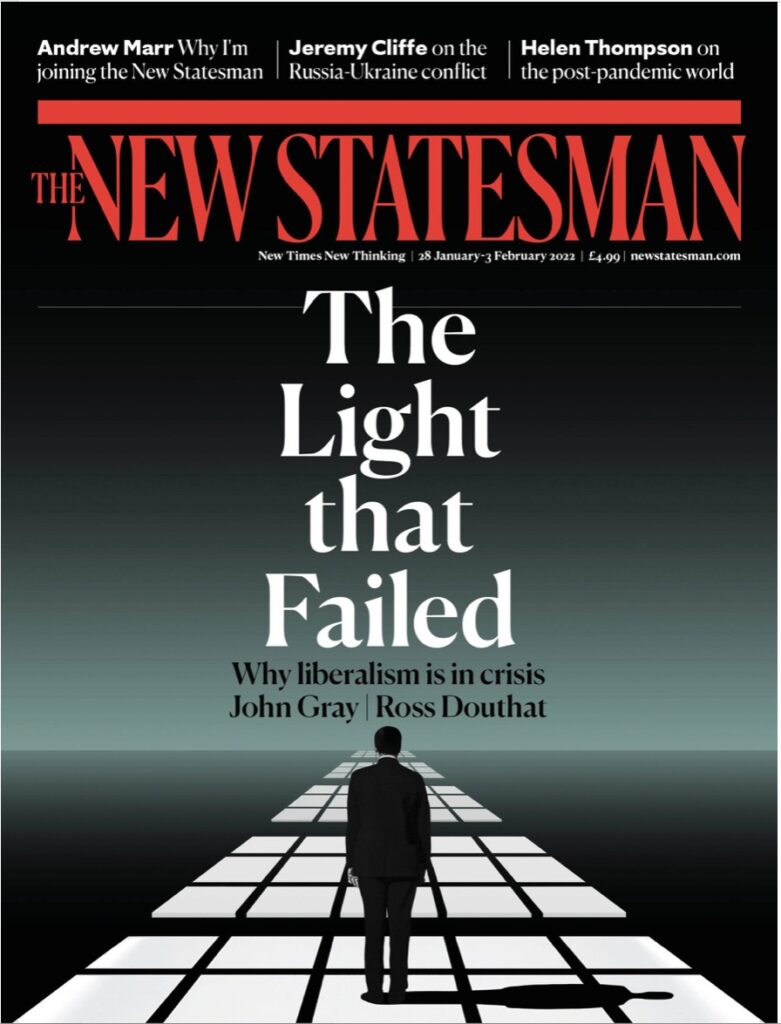
I was fascinated to read Why Liberalism is in Crisis in the New Statesman, which takes the form of a dialogue between John Gray and Ross Douthat. I’m familiar with Dr Gray, a British philosopher; Mr Douthat is a New York Times columnist, with a practising Christian perspective (i.e., to contrast with my own non-practising, agnostic Christian perspective, and Dr Gray’s Christian-influenced atheism). They are both highly sceptical of the liberal establishment, but are both deeply rational, and clearly Western liberals in the broad sense. As such I appreciated and enjoyed the article.
Despite their differences, both men agree that liberalism is in retreat, both within Western societies, and globally. They have an intense dislike of the “woke” consensus, as well as right-wing populist irrationality. Interestingly they think that the fashionable pessimism about the future of Western democracy is overdone. But they are firm believers in the global decline of the West: Taiwan is as good as gone, so far as they are concerned – while the rise of China, India and Russia is relentless and continuing – though I’m not sure if Mr Dothat agreed with all of the last bit (i.e. the inclusion of Russia). But neither think that these rising powers is promoting a universal credo to replace liberalism, as the Soviet Union once attempted. Instead Christian universalism is being replaced with something much more focused on national and ethnic identities. Optimism about the spread of liberalism had been based on the idea that it is the route to economic prosperity – but the rise of China has given the lie to this, says Dr Gray. Meanwhile Western ruling elites seem to be in denial about all of this.
If you break down the article into individual statements about the political state of play, I would agree with most of them. Furthermore, I would agree with two of the writers’ big conclusions: that the decline of Western liberal democracy is overdone by most commentators, and that the political heft of the West has declined sharply, as China in particular has advanced, while Russia makes mischief in the vacuum left behind. Where I disagree is that liberalism, and a belief in cosmopolitan liberal democracy, will simply retreat into being the West’s house philosophy, while the rest of the world moves to various flavours of nationalist autocracy. I think that liberalism is outgrowing the West.
This is for a number of reasons. The first thing is that I don’t think that universalism is dying. According to Dr Gray the West’s universalist out look derives from the fact that Christianity was the world’s first major universalist religion. Christian’s believe their message is for all nations. It shares this outlook with Islam but not, say, Judasm or Hinduism. Buddhism seems less tied to ethnicity, but you don’t hear of Buddhist missionaries, and its forms seem closely tied to local traditions in, say, Tibet, Sri Lanka, Burma, Thailand, and so on. After Western imperialism burned out, Christianity followed the West’s commercial expansion. Perhaps the same might be said of Islam: expanding through conquest at first, and then through commerce. But Christianity is burning out – though the authors spend a bit of time talking around the possibility of a Christian revival. More contentiously, I would say that Islam is heading down the same road. So if I accept that universal religions are in terminal decline, why do I say that universalism is alive and well? Because communication technology has so reduced the barriers to universal communication. Almost everybody either has access to the internet, or aspires to it. Memes cross boundaries all the time. China is creating its on separate online world, but it can hardly hope to keep out international influences entirely – and once inside they will spread rapidly. China is already heavily influenced by Western ideas, from Marxism, the centrality of science, the embrace of capitalism to Western fashions. This is not one-way traffic, of course, as the west consumes non-Western ideas voraciously. Above all this interconnectedness promotes a certain lifestyle of which the Western middle classes are the apogee. Furthermore, the world is beset by worldwide problems, from climate change to global trade and finance. People think of themselves as human and inhabiting the planet as a single homeland. This awareness is crying out for a philosophy which embraces this idea. Nationalism, on the other hand, ends up by promoting conflict with neighbours and minorities.
The next point is that the autocratic ways of non-Western nations are in collision with the idea of individual autonomy, for which demand will rise as prosperity develops. The autocracies are stuck with an awkward dilemma. Their principal justification is that personal autonomy needs to be sacrificed in order to advance prosperity and harmony. If they don’t deliver these things, their legitimacy declines – as is happening in Russia. If they do deliver – as China is managing – demand for individual autonomy will rise, placing more pressure on the governing elite in due course. Popular resentment may not focus on demand for democracy, but it instead on corruption. The presence of corruption means that individuals are routinely humiliated by state power – personified by a lowly official rather than the commander-in-chief. Rampant corruption blights all the nationalistic autocracies. The Chinese leadership understands this threat very well, and is fighting corruption hard. But it is doomed. Its method is to concentrate yet more power to the central elite, creating more opportunities for either corruption or jobsworth local rule – which can be just as undermining of authority in the long term. Only Singapore has managed to establish autocracy and clean government at the same time – and for that it surely depends on its small size. Where the West has failed to impose its influence, in Afghanistan for example, it is largely because it had no answer to rampant corruption.
Meanwhile, each of the developing non-Western powers has a strong dependence on trade with the West. China cannot seem to break out of its huge trade surplus. In the short term this puts China in a strong position – it stockpiles Western currencies, and creates dependencies for certain products. But the country would face social collapse if it was unable to export at such volumes. And all the countries depend on the West for certain high-technology components. Their elites build bolt-holes in Western countries in case things should sour in their own.
The strength of liberalism is that it provides answers to all these challenges in a way no other system does. It embraces the idea that all people are equal and share mutual interests. It provides for a system of accountability that is the surest way of stemming corruption and providing individual autonomy. By no means all democracies have corruption under control – but nearly every country which does have corruption down to manageable levels is a liberal democracy (Singapore is the stand-out exception). The secret of liberalism is not its Western heritage, but that fact that it solves problems, and that it is the best way to secure the middle-class lifestyle than most of humanity aspires to. There may be alternatives to advancing towards that objective, but not to holding it. China, India and Russia will all discover this in their own way.
Perhaps the best way to demonstrate what I am talking about is on the Korean Peninsula. South Korea is by no means a country of Western heritage. It was colonised by Japan, not by any of the Western powers. And yet cosmopolitan liberal democracy has taken root there, and the country is amazingly prosperous. Part of their journey was through nationalist autocracy, but this could not be sustained. Meanwhile in the north, a rejection of such values has led to a spiral of totalitarianism. North Korea consistently fails to feed itself, while investing heavily in the military to secure its future. Countries like China and Vietnam have retained their autocratic ways, and not shared North Korea’s fate – as they have embraced capitalism. And yet ultimately even these well-managed autocracies will face the choice of following one or other of the Koreas.
What we in the West have to realise is that our collective political power is in relative decline, and that we no longer rule the world – not that we ever did, but it has been an implicit assumption made by thinkers of left and right, who attribute all the world’s failings to Western policy failures. And the West no longer rules liberalism either. This hugely power set of ideas have a life all their own. Liberalism is not in crisis – but the self-confidence of the West is.


